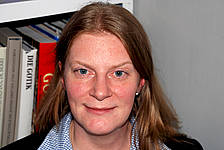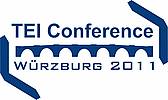Keynote Speakers
Edward Vanhoutte (Gent): "So You Think You Can Edit? The Masterchef Edition"
Wednesday, 12 October 2011, 18:00h, Toskana-Saal

Culinary history shows that every wave of gastronomic innovation is directly followed by a reflective appreciation of traditional cooking techniques, terroir cuisine, and local produce. Moreover, the subtle balancing of the four basic tastes – sweet, sour, bitter and salty – and the more recently discovered fifth taste umami, together with a perfect control over texture and temperature in innovative food creations refer more to traditional cooking than newcomers in the food trade generally acknowledge. Surely, technological research and development affects the clientele's food experience because it alters the way chefs cook and dress up their dishes but it hardly replaces the achievements and insights of traditional cooking. An inclusive approach towards tradition and innovation is therefore key.
Likewise, our thinking about the digital scholarly edition should take an inclusive approach towards the accomplishments of the past. The current models for the social edition tend to underestimate the essential function of the scholarly edition in the transmission of (literary) works to next generations and focus mainly on collaboration, engagement, and participation. Claims about the 'anonymous' apparatus variorum, the failure of 'self-contained' editions and the role of the editor as 'progenitor of knowledge creation', for instance, signal some misunderstandings of traditional bibliography from the perspective of the social web. It seems that the attack on the authorial intention by sociological theories – the work as a social product – and processional theories – the work as a process rather than a product – in the 1980s and 1990s now migrates to an attack on the editorial role by the advocates of the social edition who see the scholarly text as a uniquely collaborative process defined by the available social technologies.
Therefore I wish to reiterate the importance of the 'four traditional basic tastes' of a scholarly edition – the constituted reading text, the apparatus variorum, the genetic and transmissional history, and the commentary – and add social technologies as savoriness or umami to the editorial dish. Surely, technological research and development affects the user's experience with a digital edition and it alters the ways and the conditions in which editors edit and construct their editions, but it hardly replaces the achievements and insights of traditional bibliography. An inclusive approach towards tradition and innovation is therefore key.
Biography:
Edward Vanhoutte is currently Director of Research and Publications in the Royal Academy of Dutch Language and Literature - KANTL (Gent, Belgium; and head of the Centre voor Scholarly Editing and Document Studies - CTB. He is also a Research Associate of UCL Centre for Digital Humanities (University College London). Edward is Editor-in-Chief of LLC. The Journal of Digital Scholarship in the Humanities, Managing Editor of Verslagen en Mededelingen van de Koninklijke Academie voor Nederlandse Taal- en Letterkunde, and member of the editorial boards of Digital Studies / Le champ numérique, (SDH/SEMI) and TEI Extramural Journal-EJ. He publishes widely on (electronic) textual and genetic criticism, electronic scholarly editing, and humanities computing and he is co-author of TEI by Example. Edward serves as a member of several boards and councils such as the Huygens Institute - ING, the executive council of the ALLC, and the technical committee of the dbnl: Digitale Bibliotheek der Nederlandse Letteren. His research interests include text-encoding and markup of modern manuscript material, electronic scholarly editing, genetic editing, and the history of electronic editing and humanities computing. Occasional blogs on Humanities Computing can be found on The Mind Tool: Edward Vanhoutte's Blog.
email: edward.vanhoutte@kantl.be | Twitter: @evanhoutte
Andrea Rapp (Darmstadt): "From text technology to cultural technology: the role of the TEI in Virtual Research Environments"
Thursday, 13 October 2011, 16:00h, Hubland-Campus ZHSG 0.001

Virtual research environments which are supporting and at the same time altering the research process in the humanities are currenty booming: they enable access to digital resources, tools and research findings in an unprecedented way. Standards, metadata and annotations are playing an eminently important role in this, and not only with regard to interoperability and sustainability of resources. For analogue representations of textual expression, cultural practices have been in the making / undergoing constant development for centuries. These practices affect the ways in which information and knowledge are stored, transmitted, explored, discovered etc. In the course of the development negotiations over (metadata-)standards, especially the TEI Guidelines, philologists have provided insights into the structure of texts, the organization of knowledge, the establishment of networks and the explicitation of this type of information. The development of bespoke cultural technologies can thus benefit from this knowlegde in order to address and establish new research questions and methods. In this paper, I am going to address and pursue these issues and challenges on the basis of concrete examples such as FuD, TextGrid, Dariah, Clarin). In particular, I will address the questions such as which cultural technologies are currently promising fruitful approaches to research questions of the humanities in the 21st century, how these can benefit from the experience of textual scholarship in the previous centuries and how current virtual research environments are likely to alter the face of textual scholarship in the future.
Biography:
Since 2010 Andrea Rapp is a professor for medieval studies and computer philology at the Department of Linguistics and Literary Studies at Technical University Darmstadt. She has been the head of the Goettingen Digitization Center at the State and University Library in Goettingen (2003-2004), afterwards one of the executive directors of the Center for Digital Humanities at Trier University (2004-2010). She has been working in the field of digitization, digital editions, electronic dictionaries, and digital humanities in general for over 20 years. She is in charge of several DFG- and BMBF-funded projects and is one of the initiators of the TextGrid project.
website: ![]() http://www.linglit.tu-darmstadt.de/index.php?id=rapp0
http://www.linglit.tu-darmstadt.de/index.php?id=rapp0





